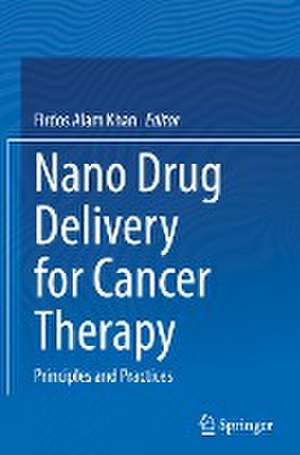Nano Drug Delivery for Cancer Therapy: Principles and Practices
Editat de Firdos Alam Khanen Limba Engleză Hardback – 9 ian 2024
Preț: 1112.60 lei
Preț vechi: 1356.83 lei
-18% Nou
Puncte Express: 1669
Preț estimativ în valută:
212.90€ • 222.74$ • 176.85£
212.90€ • 222.74$ • 176.85£
Carte tipărită la comandă
Livrare economică 03-17 aprilie
Preluare comenzi: 021 569.72.76
Specificații
ISBN-13: 9789819969395
ISBN-10: 9819969395
Pagini: 251
Ilustrații: XIII, 251 p. 1 illus.
Dimensiuni: 155 x 235 mm
Greutate: 0.55 kg
Ediția:1st ed. 2023
Editura: Springer Nature Singapore
Colecția Springer
Locul publicării:Singapore, Singapore
ISBN-10: 9819969395
Pagini: 251
Ilustrații: XIII, 251 p. 1 illus.
Dimensiuni: 155 x 235 mm
Greutate: 0.55 kg
Ediția:1st ed. 2023
Editura: Springer Nature Singapore
Colecția Springer
Locul publicării:Singapore, Singapore
Cuprins
Ch 1 Significance of nano-drug delivery in cancer therapy, application of nanoparticles in overcoming drug resistance, targeted therapy, and Immunotherapy.- Ch 2 Synthesis of different types, shapes, and sizes of nanocarriers using synthetic and biological approaches.- Ch 3 Synthesis of nanocarriers loaded with anti-cancer drugs by using functionalization or conjugations, encapsulation methods.- Ch 4 Nano-Drug Carriers for Chemotherapeutic Agents Delivery in Cancer Disease Treatment.- Ch 5 Testing Of Nanocarriers Loaded with Chemotherapeutic Agents in the Animal Models of Cancers – Preclinical Trials for Efficacy and Safety Profiling of Nanocarriers.- Ch 6 Testing Of Nanocarriers Loaded With Chemotherapeutic Agents In The Animal Models Of Cancers – Preclinical Trials For Efficacy And Safety Profiling Of Nanocarriers.- Ch 7 Nanocarriers-Based Products In The Market, Fda Approval, Commercialization Of Nanocarriers, and Global Market.- Ch 8 Limitations of Nanocarriers Such as Cell and Tissue Toxicity, Genotoxicity, Scale-Up of Nanomaterials.- Ch 9 Health And Environmental Hazards Associated With The Synthesis Of Nanomaterials-Respiratory Diseases, Government Regulations, Ethical Issues.- Ch 10 Future trends and innovation in nano drug delivery for cancer therapy, application of siRNA (nanoparticle-based RNA) therapy, Ultrasound linked nano-cancer therapeutics, and application of exosomes-based cancer therapy.
Notă biografică
Prof. Firdos Alam Khan is a chairman of the Department of Stem Cell Biology, Institute for Research and Medical Consultations (IRMC), Imam Abdulrahman Bin Faisal University, Dammam, Saudi Arabia. In addition to his research work, he has been teaching (cell physiology and biochemistry and stem cell biology and regenerative medicine) courses to MSc students. Prof. Khan has done his Ph.D. degree in zoology with a neuroscience specialization from Nagpur University, India. Over the past 26 years, Prof. Khan has been involved in teaching various courses such as cell biology, pharmacology, business of biotechnology, biomedicine, cell & tissue engineering, and bioethics-IPR to undergraduate and postgraduate students. Prof. Khan worked with Manipal Academy of Higher Education, Dubai Campus, United Arab Emirates as a professor and chairperson, School of Life Sciences. Prof. Khan did his first postdoctoral fellowship from the National Centre for Biological Sciences, Bangalore, India, anda second postdoctoral fellowship from Massachusetts Institute of Technology (MIT), Cambridge, USA. Professor Khan has also worked with the Reliance Life Sciences as a Research Scientist in the Stem Cell Research Laboratory. Prof. Khan has been granted 8 US patents and published 5 US patents. Prof. Khan has published more than 119 research papers in peer-reviewed journals.
Textul de pe ultima copertă
This book discusses the various modes and methods of nano-based drug delivery in different types of cancers such as colon, breast, cervical, ovarian, and lung cancer. It reviews the significance of nano drug delivery in cancer therapy, the application of nanoparticles in overcoming drug resistance, targeted therapy, and immunotherapy. The book also covers topics related to the synthesis of different types, shapes, and sizes of nanocarriers using synthetic and biological approaches. Further, a chapter explores the synthesis of nanocarriers loaded with anti-cancer drugs by using functionalization or conjugations and encapsulation methods. The book also examines the nanocarriers as delivery vehicles for chemotherapeutic agents against cancers using in vitro and animal models of cancers, preclinical trials for efficacy, and safety profiling of nanocarriers. Finally, future trends and innovation in nano drug delivery for cancer therapy, application of siRNA (nanoparticle-based RNA)therapy, ultrasound-linked nano-cancer therapeutics, and application of exosome-based cancer therapy topics are discussed. Towards the end, the book examines the limitations of nanocarriers, including the cell and tissue toxicity, genotoxicity, and scale-up of nanomaterials, health and environmental hazards associated with nanoformulation synthesis, respiratory diseases, government regulations, and ethical issues.
Caracteristici
Discusses applications of nano drug delivery Explains the synthesis functionalized and conjugation nanocarriers Elaborates on advantages and limitations of nanocarriers
